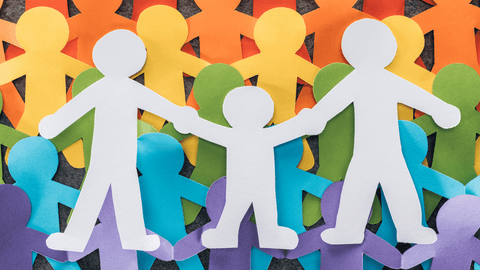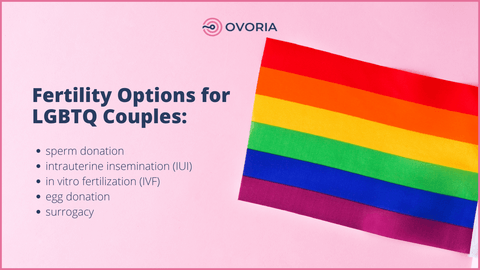Fertility Options for LGBTQ Couples
The LGBTQ couples or transgender people can face challenges, especially with biological issues, during thinking of Starting and building a family. But there is good news because of third-party reproduction, which offers few options for same-sex couples. Thanks to this option, LGBTQ couples can turn their dream of having a family into reality. This article will find information about third-party reproduction, LGBTQ fertility treatments for same-sex couples, lesbian couples and gay couples.

LGBTQ couples or transgender people can face challenges during family building, especially with physical issues. But there is good news because of third-party reproduction, which offers few treatment options for same-sex couples. Thanks to this option, LGBTQ couples can turn their dream of having a family into reality.
In this article, you will find information about third-party reproduction, fertility options for lesbian couples, gay couples, and transgender individuals.
What is Third-Party Reproduction?
Third-party reproduction (TPR) is a human reproduction when a couple or person cannot conceive with their gametes, eggs, sperm or is unable to carry a pregnancy and give birth to a baby due to infertility issues. There are a few types of third-party reproduction for patients who are unable to conceive with their gametes:
- Egg donation: the process of assisted reproductive treatment where one woman donates eggs to enable another woman to conceive. Usually, this type of treatment involves In Vitro Fertilization technology with fresh or frozen eggs.
- Sperm donation: the process in which semen is collected from a man (known as a sperm donor or sperm offer) and used for artificial insemination by a woman who wishes to become pregnant. This may also be known as "semen donation."
- Embryo donation: the part of third party reproduction which allows a couple to become parents utilizing genetic material by fertilized embryos which another person provided.
- Surrogacy: the legal arrangement where a surrogate woman carries a child for another person or couple, who will become the child's parent(s) after birth.
Fertility Options For The Same-Sex Couples
Because of advancements in assisted reproductive technology, same-sex couples have more options to use during the process of a building family than earlier. Before the genetic screening,diagnostic testing and monitoring the health of future parents, it is essential to discuss with their doctor family planning goals; after testing, your fertility team will work with you to develop the most appropriate treatment regimen for you and your goals. Potential treatment for same-sex couples can include:
- Sperm donation;
- Intrauterine insemination (IUI);
- In vitro fertilization (IVF);
- Egg donation;
- Surrogacy.

Fertility Options For Lesbian Women and Couples
For lesbian couples, the fertility options can include:
- In vitro fertilization (IVF) with donor sperm: this is a treatment based on the combination of gametes from the future mother and sperm from a donor. Depending on the country's applicable law and private agreements, there are two types of sperm donor:
- An anonymous donor is a man who donates his sperm through a sperm bank and his identity remains disclosed, but the sperm bank's database will provide such information as race, religion, complexion, education, and family medical history. Even when the child turns 18, the sperm donation act will be completely disclosed, which means that parents of the child can not tell the child how they were conceived.
- A known donor has not disclosed the identity of the man who donates sperm, which means that at the age of 18 the child has the right to know who their donor was.
- Intrauterine insemination (IUI) with donor sperm: artificial insemination with donor sperm or heterologous insemination is a standard fertility treatment. It's easier to perform than surgeries, and complex instruments are not required. If the woman meets all the tubal patency and ovarian function requirements, intrauterine insemination is expected to guarantee a minimum success rate.
- Reciprocal In vitro fertilization (IVF): the type of in vitro fertilization - and assisted reproductive procedure - where the embryos are made using partner's eggs but are put inside another partner's uterus to carry the pregnancy. That means the biological mother is genetically related to the child, and the carrier mother is biologically bonded to the child through pregnancy.
Fertility Options For Gay Men and Couples
Thanks to reproductive technology, few fertility options will help gay couples build a family and become parents. Fertility options for male couples can include:
- IVF with egg donor: this type of treatment is an excellent option for male couples dreaming of becoming parents. A partner who undergoes this fertility process will receive hormone therapy to stimulate the ovaries to produce multiple eggs. A fertility specialist retrieves these eggs once they are mature. Then these eggs can be frozen for future use. Once thawed, the embryologist will use the father’s sperm to fertilize the eggs. The embryologist will monitor the fertilization of the eggs, then transfer any resulting embryos into the surrogate’s uterus.
- Gestational surrogacy:
it is an agreement when a woman carries and delivers a baby for another person or couple. The woman who carries the baby is the gestational surrogate or gestational carrier. The parents are known as the intended parents, and they are involved in the pregnancy, and after the baby’s birth, they become the child’s parents.

